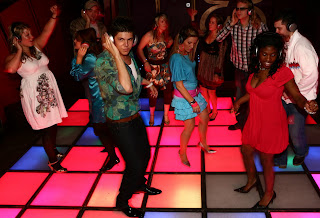
Dancing in silence. Seems bizarre but it's not quite what it seems so read on. There are some very interesting implications of our love of clubs and live music: 30% of 18-40 year olds have diminished hearing and as a result EU legislation is coming in to ban PAs over a certain volume (the equivalent of four people talking). Which will make for very bizarre/quiet/unsatisfying gig/festival/club experiences! This didn't make the Metro story, as it's kind of dry, but this is the backstory to the silent disco concept. Nico Silent Disco is going to save our hearing! Can you imagine a future where you rave with headphones on, and there's no smoking. It seems like a furistic vision, but it's not that far away is it?? This was appeared in metro last week.
CLUBS
Silent Disco
Silent Disco is the solution for the perennial festival quandary: what to do when the stages and arenas have powered down for the night (usually around 11pm or midnight), and you still want to party? Before Silent Disco you might have followed your ears and stumbled across a battery-powered sound system or a guitar/bongo jam around a fire, or wandered the site until your party mojo waned.
Silent Disco made its UK debut at Glastonbury 2005, and proved a panacea for the clash between locals and festivalgoers wanting to sleep, and nocturnal hedonists. On entering the Silent Disco tent every person is given a set of headphones, each broadcasting the same DJ mixing. From the outside it looks like a 'silent disco', but with the headphones on you’re part of a thousand-strong dancefloor getting down to the same music (supplied by Silent Disco’s No DJ or DJ OD).
Silent Disco will be at many of this summer’s festivals (Glastonbury, T In The Park, Edinburgh Festival and Carling Weekender), but you can also experience it with No DJ at Royal Festival Hall's 48-hour launch, tomorrow and Saturday (June 1 & 2).
'The Royal Festival Hall will be different to the festivals because it's a dedicated party, so we will refer to the famous open air dances at the South Bank in 1951 when it was reopened after World War II,' explains Silent Disco co-founder Nico Okkerse (DJ No). 'We will broadcast actual footage of these on huge screens, so it will look and spectacular.'
Dancing in silence, while wearing headphones seems insular, individual and at odds with the idea of listening to music in public as a social, interactive experience. 'If you take your iPOD and put the headphones in then you have an individual experience,' explains Okkerse. 'At Silent Disco you will be one of several hundred listening and reacting to the same music - you can dance, make eye contact and hear the music better than in a gig or club. You're able to take out a headphone out start a philosophical debate, which is difficult in a club, so it’s very social.'
Okkerse believes Silent Disco offers an alternative way of experiencing music in public, and the human interaction that follows, with mind-boggling potential: for example, a Silent Disco broadcasting different soundtracks simultaneously.
'At last year’s Lowlands festival in Holland we had Nellie Mckay a singer-songwriter from New York playing at on one channel, while on another channel we had house DJ, Monica Electronica,' explains Okkerse. '15% of the audience preferred house and were jumping around, but the vast majority just stood there dreaming away to Nellie McKay. Nobody had a problem with it and in that sense I see a big future with different social groups listening to different music.'
'There are so many new possibilities, Silent Disco may take another decade to be accepted as an alternative way of listening to music in public.'
Silent Disco will be at the Edinburgh Festival, Glastonbury, T In The Park and Reading/Leeds.